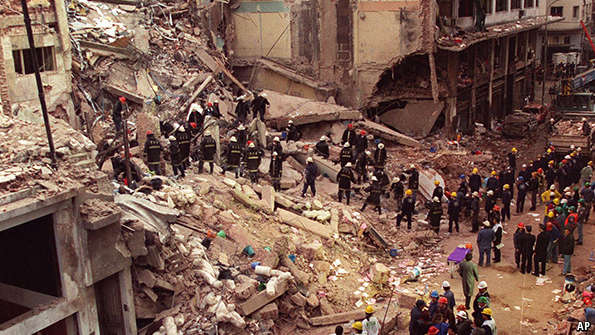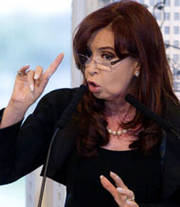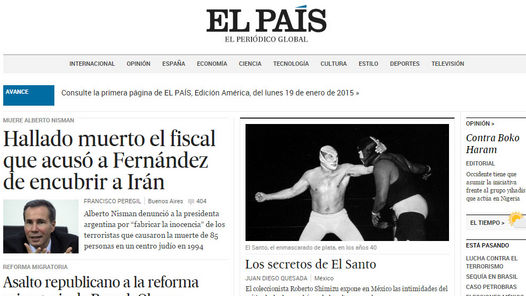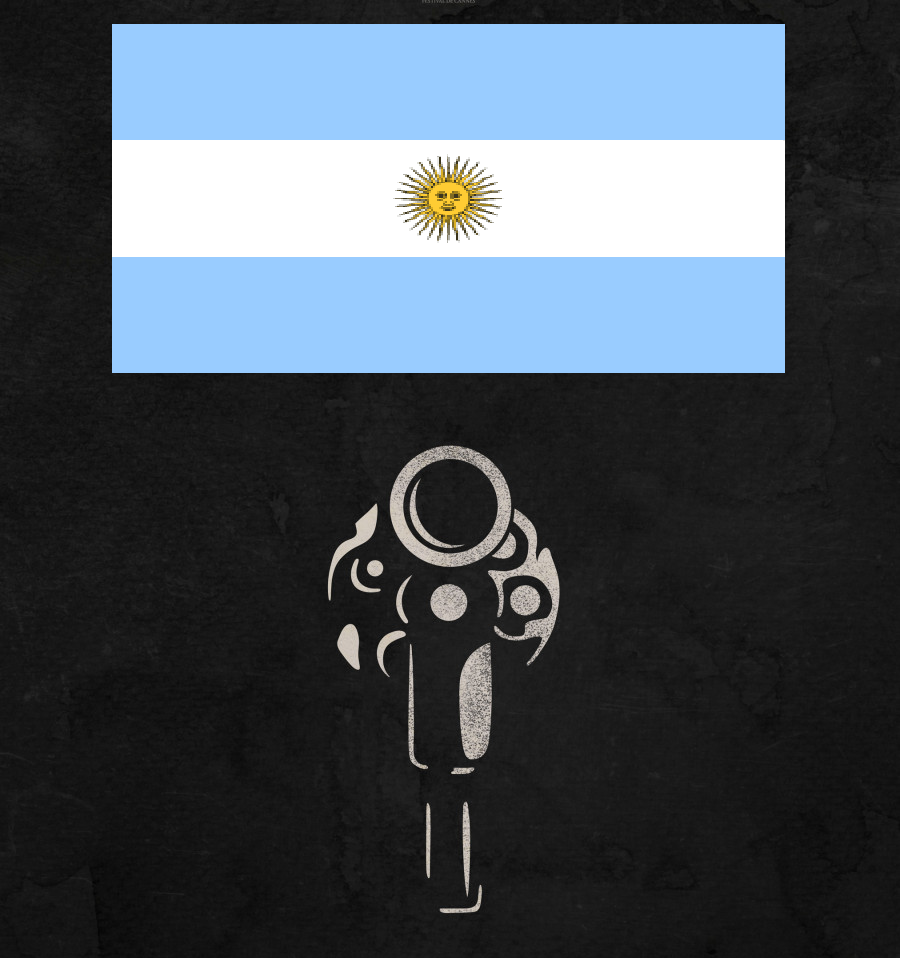Nisman: “Yo puedo salir muerto de ésto”
enero 19, 2015
Nisman: “Yo puedo salir muerto de ésto”
Por Natasha Niebieskikwiat.
Se lo dijo hace unos días el fiscal especial del caso AMIA a Clarín.

Datos. Nisman, el miércoles, tras dar a conocer su denuncia. / FERNÁNDEZ
Fue una frase tan trágica como premonitoria. El fiscal especial del caso AMIA, Alberto Nisman, que apareció muerto hoy en su departamento de Puerto Madero, le dijo a Clarín días atrás una oración que marcó su destino. «Yo puedo salir muerto de ésto», afirmó.
 El sábado, en otro contacto con esta cronista, repitió la terrible frase.
El sábado, en otro contacto con esta cronista, repitió la terrible frase.
A pesar de la presión que había sobre él y de la feroz embestida del kirchnerismo en su contra, Nisman estaba confiado en la solidez de su denuncia por encubrimiento contra la presidenta Cristina Fernández de Kirchner, el canciller Héctor Timerman, el diputado Andrés «Cuervo» Larroque, Luis D’Elía y Fernando Esteche.
Clarín chateó por última vez el sábado. Nisman dio un ok final a lo conversado a las 21:17 por Whatsapp. No quería hacer ya declaraciones y comentó que siempre leía las notas de esta periodista. Ayer domingo no contesto ninguno de los mensajes de Whatsapp, pero sí aparecían como recibidos. Por lo general, el recibía mensajes de textos y Whatsapp y llamaba de la fiscalía o de otros teléfonos. Fue en esas últimas conversaciones orales con este diario, como la del miércoles pasado, cuando sostuvo: «Yo puedo salir muerto de esto».
En algunos medios salió diciendo que había preparado a su hija para que hoy o el lunes se escucharan en el Congreso cosas desagradables de él. «Desde hoy mi vida cambió. Es mi función como fiscal y le tuve que decir a mi hija que iba a escuchar cosas tremendas de mi persona», dijo a TN el miércoles, horas después de sacudir al país con su denuncia.
La diputada ultrakirchnerista, Diana Conti, tomó esa frase, luego de la confirmación de que Nisman iba a concurrir al Congreso para brindar detalles de su investigación en un encuentro reservado. «Le decimos a la hija de Nisman que se quede tranquila, que no vamos a agredir a su papá», manifestó Conti.
En las últimas charlas con Clarín, donde subrayaba que no podía revelar ni el nombre de los agentes ni otras cuestiones si no se levantaba el secreto, pidió que necesitaba concestrarse y encerrarse este fin de semana para estudiar su presentación de hoy ante la Comisión de Legislación Penal de la Cámara de Dipuados que preside Patricia Bulrich. En ningún momento daba la sensación de tener un ánimo suicida.
Hoy, tras la confirmación de la muerte del fiscal que denunció hace menos de días a la Presidenta, todas las palabras cobran otro cariz. «Esto va a llevar tiempo, pero va a llegar a buen puerto. Me gustaría equivocarme por la institucionalización del país pero creo que no», expresó Nisman, tras su denuncia.
Horas atrás, apareció sin vida en el baño de su departamento.
Fuente: Clarín, 19/01/15.
Argentina de Luto por la impunidad
enero 19, 2015
.
.
.
Argentina: Oil and trouble
enero 16, 2015
Oil and trouble
A prosecutor accuses the president of obstructing justice in the country’s biggest terror case

 THE enemies of Argentina’s president, Cristina Fernández de Kirchner, have accused her of all sorts of transgressions during her seven years in power, from cronyism to pushing through unconstitutional laws. On January 14th a federal prosecutor leveled what may be the gravest accusation yet: that she obstructed justice in the investigation of the country’s deadliest terror attack.
THE enemies of Argentina’s president, Cristina Fernández de Kirchner, have accused her of all sorts of transgressions during her seven years in power, from cronyism to pushing through unconstitutional laws. On January 14th a federal prosecutor leveled what may be the gravest accusation yet: that she obstructed justice in the investigation of the country’s deadliest terror attack.
In 1994, a van packed with explosives drove into AMIA, a Jewish community centre in Buenos Aires, and blew up, killing 86 people (including the terrorist) and injuring 300. No one has been tried for the massacre, but Argentine prosecutors, Jewish advocacy groups, the state of Israel and Interpol have all accused Iran of orchestrating the attack and Hizbullah, a Lebanon-based Islamist group, of executing it.
In 2013, Argentina announced that it would collaborate with Iran in a joint commission “to advance knowledge of the truth about the attack,” as Ms Fernández wrote on Twitter at the time. The country’s Jewish population, the world’s seventh largest, was puzzled and angry about the accord. Now the prosecutor, Alberto Nisman, alleges that the controversial deal was reached in back-channel negotiations that Ms Fernández initiated with Iran. He claims that she offered to cover up the involvement of any Iranian officials in exchange for increased trade. Argentina would export grain to Iran, while Iran would sell oil to Argentina to ease its severe energy deficit.
In the end, for reasons that are still unclear, the negotiations failed and the deal fell apart. But Mr Nisman has marshalled evidence of the talks in a 300-page document that he filed in a Buenos Aires court. “They decided, negotiated, and assured the impunity of the fugitive Iranians in the AMIA case with the aim of faking Iran’s innocence to serve geopolitical and commercial interests,” Mr Nisman declared. The allegations against Ms Fernández, her foreign minister, Héctor Timerman, and others are based on “irrefutable proof” from two years of investigations and myriad wiretaps, Mr Nisman claims.
This is the second time he has gone after a head of state for interfering with the investigation of the bombing. In 2009, his sleuthing led to the indictment of Carlos Menem, who was president at the time of the attack. He was accused of tampering with evidence that implicated a Syrian businessman. The case is still in progress. Mr Menem, if guilty, may have been protecting a friend. Ms Fernández’s motives—if she acted as the prosecutor alleges—appear to be more political and economic.
One of Ms Fernández’s top aides dismissed the allegations as “ridiculous”. Just what effect they will have on her and on the country’s politics more generally is hard to guess. Much depends on how effectively she refutes them. She cannot run in this year’s presidential elections, which take place in October.
Other prospective candidates are already seeking to exploit the controversy. Sergio Massa, a former ally, has called for the resignation of Mr Timerman (the son of a prominent—Jewish—opponent of Argentina’s military dictatorship), who has also denied the charges. But the main effect of the allegations may be to shake the confidence of an already cynical electorate in the integrity of the country’s governing institutions.
Source: The Economist, 16/01/15.
.




